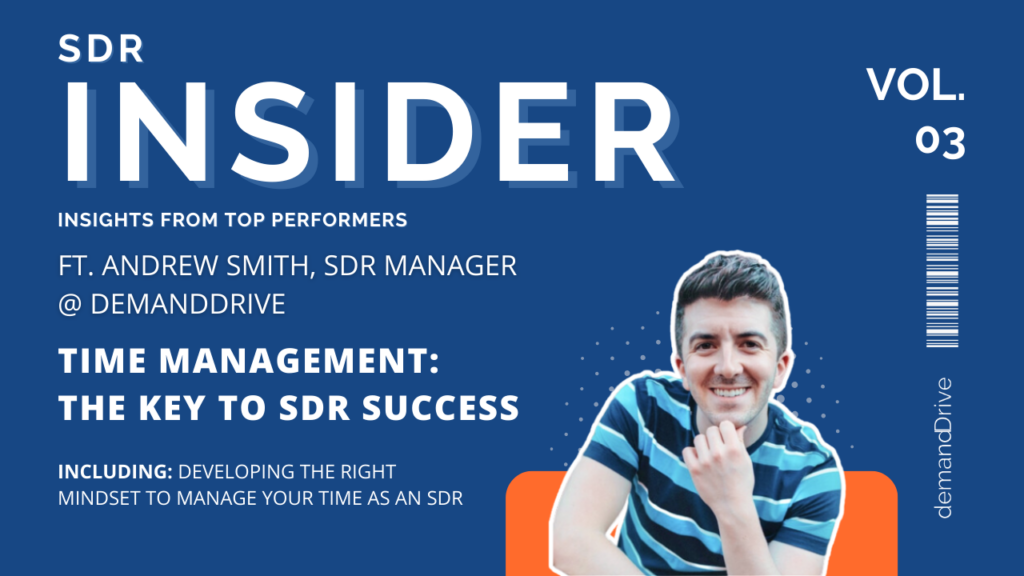The Importance of Coaching for SDRs
5 Questions with Davidson Hang
🧑🏫 The Importance of Coaching for SDRs
A lot of managers think they’re good coaches. But very few are actually impacting the success of their team from a coaching perspective.
Why? What’s holding managers back from adding an effective coaching cadence to their responsibilities? Davidson helps shed some light on the differences between coaching and managing and where most teams fall short.
Managing and Coaching SDRs are two distinct, equally important, roles.
We all know what managing looks like – reinforcing core skills, ensuring reps update their CRM, reviewing pipeline…the things that make the sales development engine hum.
Coaching, however, looks a bit different. And while managers are often tasked with coaching, the responsibilities of a coach go beyond just making the engine hum.
🎓 They’re developing internal learning material (courses, workshops, training programs)
🧠 They’re helping reps upskill and improve upon core competencies
📈 They’re offering up time for professional development
In short, they’re looking to improve on the existing engine. How much faster can it go? Where can you tighten up inefficiencies? What parts do you need to ensure it keeps running?
Our guest, Davidson Hang of Udemy, knows a thing or two about effective coaching.
He’s mentored SDRs and helped them land AE positions. He’s interviewed hundreds of top sales reps. And he works with leaders every day to transform & scale their organizations through access to digital coaching.
Tune in to learn about the value of coaching, where it differs from managing, and how to unlock the potential of your SDR team.
Our Guest
What He Does: Davidson is an Enterprise AE at Udemy
How to Connect: Davidson’s LinkedIn | Davidson’s LinkTree
Structure & Questions
- Let’s start with a quick definition. What does it mean to manage someone? Coach someone? Biggest differences between the two?
- What are the typical “end goals” or “success metrics” associated with coaches vs. managers? What are they trying to accomplish?
- Why do a lot of managers fail to effectively coach their SDRs?
- How can a manager/coach get the most out of their rep? Obviously, it’s circumstantial, but what are some best practices that a manager/coach can tap into?
- Ok, I’m convinced I need coaching. Where do I go? Where can I find coaching resources?
A lot of managers think they’re good coaches. But very few are actually impacting the success of their team from a coaching perspective.
Why? What’s holding managers back from adding an effective coaching cadence to their responsibilities? Davidson helps shed some light on the differences between coaching and managing and where most teams fall short.
Key Takeaways
Highlights, Notes, and Resources
Biggest Takeaways
🎭 Interpersonal skills. Office politics. Call it what you like, but how you’re perceived in the workplace is a huge determining factor in your overall success. Coaches are a great resource to lean on when working on building out your personal brand/persona. Nobody wants to work with someone they don’t like or respect.
🧠 Some great advice from Kyle Coleman @ Clari: “Be easy to root for.” Coaches can help prepare you mentally to be the type of person people like and want to help.
👀 We have blind spots. And that normally materializes in thinking that issues you face are always outside of you/your control. But the common theme with those issues is you. Not that you’re flawed in a way that causes bad things to happen, but that you might be blind to the ways in which you’re negatively impacting your life.
Coaching helps you realize that you can/should be 100% responsible for the things in your life. And once you realize that, you can start to make the changes required to improve them.
📢 Coaching is confronting. No matter what school of thought your coach takes, at the end of the day they’re telling you what you need to change about yourself/your habits. And they can do that because they have an unbiased, 30,000-foot view whereas you’re just the “fish in a fishbowl.”
👍 Convinced that you need a coach, or that you should be a better one for your reps? Davidson lays out some great resources to leverage:
-
Look for people on LinkedIn that inspire you, or you want to be like one day. Connect and talk with them! Be proactive about reaching out to people.
-
Take the plunge and be vulnerable. You do that every day as an SDR anyways – why not do it for your own personal development?
-
-
Talk with your cross-functional peers. Have coffee chats about what they do on a daily basis. Your internal resources are an untapped wealth of knowledge for you. It’s a great career development hack.
-
The higher up they are, the nicer they are. Coffee chats with your CRO or VP of Sales might sound intimidating, but they’re usually happy to help someone who has career & growth aspirations on their (indirect) team.
-
Conversation Highlights
Note: Timestamps correspond to the YouTube video
(4:55) A good manager is both a manager and a coach. Ideally, they split their days 50/50 – one half is dedicated to managing their team’s operations, and the other half is dedicated to upskilling their team and helping them discover blind spots.
Management is more about the execution of the day-to-day tasks that dictate success. Coaching is showing the how they can do those tasks on their own.
Or, another way of thinking about it, managers are really good at laying the foundation while coaches help reps blueprint the design on top.
(6:52) Coaching isn’t just about getting someone to do their job better or helping them improve a blind spot. Coaches can help reps combat imposter syndrome or learn the ins and outs of what it’s like to work at their current company.
Metrics are just half of it. Like Davidson said, “people have to know you and they have to like you” if you want to be successful. Coaches can build out that other half and help you become a well-rounded rep – especially important if this is your first real job out of college.
(10:18) Great example of what the mentality of a good coach looks like. Saying you want to earn $200K this year is great, but how are you going to achieve it? Managers who focus on the numbers side of things can share data around how you change up some inputs to impact that final output (salary). But coaches get to integrate that goal with your life on a holistic level.
(11:41) “You could always use a coach. Because they impact so much more than just your day-to-day, 9 to 5 style job life. They impact your life life – the 5 to 9 as they say.”
Michael Jordan and Tiger Woods had coaches. Even the best need that support. It shouldn’t be looked at as a negative.
(16:32) There are 2 types of coaching. One is more confronting – they’ll trigger you and tell you what in your life needs to be improved upon. They don’t hold punches, which can hurt, but it can be an illuminating experience.
The other is working with a coach that has a similar viewpoint. Someone who thinks like you and behaves like you. It’s easy to understand where their advice is coming from because it’s familiar.
There’s no right or wrong style. Just depends on what you prefer.
(20:42) 🌴 Future episode live from Hawaii? You heard it here first!
(21:50) A good relationship with a coach starts with trust. Heck, a good relationship with your manager starts with trust as well. It’s really important to establish that early, otherwise, accountability will suffer.
One great piece of advice on building that trust? As a manager, be vulnerable first. Be less accusatory (ex: make more dials) and more sympathetic (ex: I love working smarter, not harder, and wish someone told me that early on).
(23:09) Coaching isn’t a privilege. You don’t get to coach your reps instead of managing them at some point. You should be doing them concurrently – it’s just a matter of knowing how to take a “managing moment” and turn it into a “coaching moment.” And that starts with vulnerability.
(24:04) Interesting point here. Managers were typically top-performers at one point. That means they’re responsible for reps who struggled with things that came easy to them. They could be working with reps who have different goals than they did. What worked for them won’t work for all the reps on their team.
(28:06) 1 on 1 meetings shouldn’t just be about metrics. Managers should help reps talk about career development, short & long-term goals, and their overall aspirations. But should those conversations happen separately, or alongside pipeline review?
Davidson’s story at (28:45) is a great example of how a good manager can do both.
(30:35) Do you have a “business persona?” Or do you bring your full self to work every day?
Being your authentic self at work makes it a lot easier for your managers to coach & help you.
(40:13) “The journey never ends.” There are always more layers to peel back.
Additional Resources
Don’t sleep on r/sales! The Reddit Sales community is chock full of reps sharing sales advice, examples, and stories. It’s worth a look if you’re in search of a large and diverse sales community.
Here’s the blog mentioned at 12:56 – You’re Never Too Awesome for a Coach.
Looking beyond the numbers is hugely important for managers. So important that our event, Focus on the Future, is dedicated to helping SDR Managers understand how to better connect with and enable their current team.
Some resources that Davidson recommends:
Other Episodes
Ep. 4 • 31 min.
Ep. 2 • 11 min.
Ep. 3 • 48 min.




